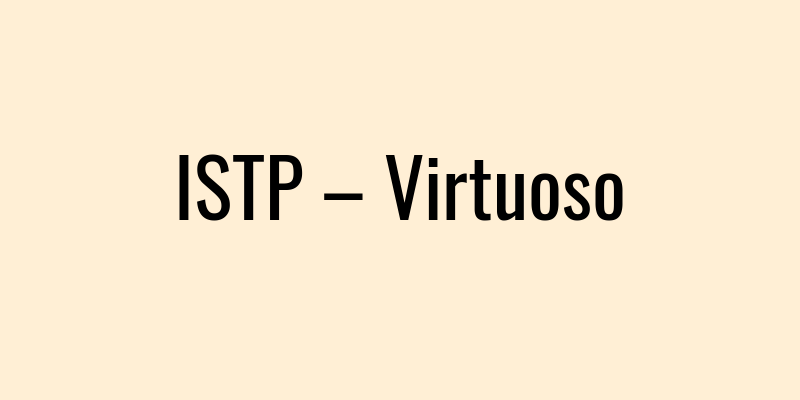Unveiling the ISTP – Virtuoso: The Master of Adaptability
Discover the strengths and weaknesses of this intriguing personality type.
The ISTP, often referred to as the 'Virtuoso,' is one of the most fascinating personality types in the Myers-Briggs Type Indicator (MBTI) framework. Known for their practicality, resourcefulness, and hands-on problem-solving abilities, ISTPs thrive in dynamic environments where they can engage their minds and skills. They have a unique ability to analyze complex situations and devise efficient solutions. However, this personality type also has its share of challenges, which may impact their personal relationships and professional lives. Understanding both the advantages and disadvantages of being an ISTP is crucial for anyone who identifies with this type or interacts with them regularly.
As individuals, ISTPs are often seen as loners or independent thinkers who prefer to work on their own terms. They value their freedom deeply and are drawn to activities that allow them to explore their interests without constraints. The dual nature of being outgoing yet introspective makes ISTPs intriguing and often enigmatic figures. In this article, we will delve into the distinct advantages and disadvantages of the ISTP personality, providing insights that are not only helpful for ISTPs themselves but also for those looking to understand them better.
Pros
ISTPs are often celebrated for their unique strengths, particularly their ability to adapt quickly and effectively in various situations. This adaptability comes from their confidence in practical skills and problem-solving abilities. They are typically hands-on learners who excel in environments where they can apply their knowledge in real-time. Not only do they thrive in situations that offer spontaneous challenges, but their analytical mindset allows them to assess risks and rewards with great clarity. Understanding these advantages can motivate both ISTPs and their peers to leverage these traits in various aspects of life.
Practical Problem Solvers: Masters of the Moment
ISTPs are renowned for their exceptional problem-solving skills. When faced with challenges, they utilize their logical reasoning and hands-on approach to devise practical solutions in various scenarios. This ability makes them invaluable team members in fast-paced work environments, where quick decision-making is crucial. Their competence in troubleshooting and adapting to unforeseen circumstances enables them to take charge, earning the respect of peers. Furthermore, their knack for thinking on their feet allows ISTPs to embrace change, making them versatile individuals who can navigate diverse situations with ease.
Independence and Resourcefulness: The Free Spirits
The ISTP personality type thrives on independence and resources in every aspect of their life. They take pride in their ability to solve problems and challenges without relying heavily on others. This self-sufficiency often fosters creativity, as ISTPs experiment with their ideas and innovative ways to tackle tasks. They enjoy discovering new methods and techniques, leading to discoveries that may enhance their professional or personal engagements. Their resourceful nature not only contributes to their success but also inspires those around them to think outside the box and explore their paths.
Calm Under Pressure: Remaining Composed
One of the standout traits of ISTPs is their calm demeanor in high-pressure situations. Unlike other personality types who might feel overwhelmed, ISTPs can maintain a level head and focus on practical solutions. This ability makes them excellent crisis managers, as they remain unphased by stress and external pressures. Their analytical skills enable them to assess situations objectively, ensuring that they make logical decisions even in the heat of the moment. This quality is a significant advantage in both personal and professional environments, allowing them to lead effectively during difficult times.
Innovative Thinkers: Creators of New Solutions
ISTPs are often innovative thinkers who approach problems from fresh angles. Their ability to think outside the box allows them to develop unique solutions that others may not consider. This creativity is particularly beneficial in fields like engineering, design, and technology, where innovation drives progress. Their hands-on approach often leads to practical applications of their ideas, enabling them to not only conceptualize but also implement changes effectively.
Adaptable Learners: Quick to Adjust
ISTPs thrive in environments that require quick adaptation and flexibility. Their ability to learn and adjust to new information or circumstances swiftly makes them well-suited for dynamic situations. Whether in a fast-paced work setting or while traveling, they can turn challenges into opportunities by swiftly adapting their strategies and approaches, making them resourceful in various life scenarios.
Skilled Observers: A Keen Eye for Detail
ISTPs possess a natural talent for observation, often noticing details that others overlook. This keen awareness enables them to assess situations quickly, identifying potential problems before they escalate. Their attention to detail can lead to better decision-making and improved outcomes, especially in practical tasks and environments where precision is key, such as mechanics or sports.
Missing a pro?
Let us know which pro you are missing!
Cons
Despite their many strengths, ISTPs also grapple with a range of disadvantages that can impact their personal and professional relationships. While their independent nature can be an asset, it can also lead to isolation and difficulty in collaborating with others. Furthermore, their pragmatic approach to life can sometimes result in a lack of emotional expression, making it challenging for them to form deep connections with those around them. Understanding these drawbacks is essential for ISTPs who want to navigate their personal growth effectively and for others who seek to build meaningful relationships with them.
Struggling with Emotional Expression: Guarded Souls
ISTPs often find it challenging to express their emotions adequately. Their preference for logical reasoning and practical solutions can lead them to prioritize facts over feelings, making it difficult for them to connect on an emotional level with others. This emotional detachment may leave friends and family feeling neglected or misunderstood. As a result, ISTPs may face challenges in their relationships, as they might struggle to communicate their needs and desires effectively. Being aware of this disadvantage can help ISTPs work towards developing better emotional intelligence and deepen their connections with loved ones.
Avoiding Commitment: The Fear of Being Tied Down
The independent spirit of ISTPs can lead them to shy away from commitment, whether in romantic relationships or career choices. Their desire for freedom and exploration often clashes with the expectations that come with long-term commitments. This aversion can result in a pattern of fleeting relationships or frequent career changes, which may leave those around them feeling uncertain about their intentions. Consequently, their reluctance to settle down can lead to misunderstandings with partners and colleagues who seek stability. Recognizing this tendency allows ISTPs to reevaluate their priorities and better communicate their desires to others.
Difficulty in Teamwork: Lone Wolves at Heart
ISTPs’ preference for independence may hinder their ability to work effectively in teams. Their hands-on approach often means they excel when working alone or leading projects, but they may struggle to collaborate with others who have different working styles. This individualism can create friction in team settings, as ISTPs might feel stifled or unappreciated in environments that require compromise and collective opinion. As such, they may find it difficult to navigate conflicts or communicate their ideas in group projects. Becoming aware of this barrier can support ISTPs in enhancing their collaborative skills and foster productive teamwork.
Difficulty with Long-Term Planning: Living in the Now
While ISTPs excel in spontaneous decision-making, they often struggle with long-term planning. Their preference for living in the moment can lead to challenges when it comes to setting future goals or considering the larger implications of their actions. This can result in missed opportunities for growth or a lack of direction in their personal and professional lives.
Challenges in Fostering Deep Relationships: Surface-Level Connections
ISTPs tend to keep their social circles small and may struggle to develop deep, emotional relationships. They often prefer practical interactions over emotional discussions, which can lead to misunderstandings with friends or partners who seek more depth in their connections. This tendency can result in feelings of isolation or unfulfillment, particularly in personal relationships.
Impatience with Red Tape: Frustrated by Constraints
ISTPs often exhibit impatience when faced with bureaucratic processes or rigid structures. Their preference for direct action and efficiency can make them frustrated in environments that require lengthy approvals or adherence to strict guidelines. This can hinder their effectiveness in roles that necessitate extensive protocol, leading to disengagement and dissatisfaction in the workplace.
Missing a con?
Let us know which con you are missing!
Conclusion
In conclusion, the ISTP – Virtuoso personality type embodies a fascinating blend of strengths and challenges. Their ability to solve practical problems, maintain composure under pressure, and embrace independence allows them to excel in dynamic environments. However, they must also navigate the complexities of emotional expression and collaboration to forge meaningful connections with others. Recognizing these nuances can help ISTPs harness their abilities while addressing the limitations that may hinder their growth. Ultimately, understanding the full spectrum of being an ISTP can lead to greater self-awareness and improved relationships with those around them.
What do you think?
Do you think the pros outweigh the cons?







